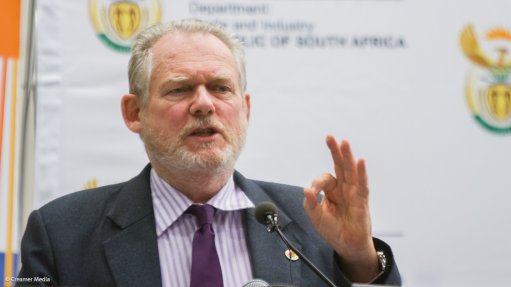
Trade and Industry Minister Rob Davies
Photo by: Creamer Media
South Africa has seen a slippage in State entities’ compliance with local procurement regulations, which the Department of Trade and Industry (DTI) seeks to rectify by introducing a tougher consequence management system.
Trade and IndustryMinister Dr Rob Davies said on Thursday that corruption often influenced tenders and procurement and that it had resulted in products being imported, rather than sourced locally.
“We are working with the auditor-general to examine processes and seek out noncompliance, after which the public entity must face disciplinary hearings before the Standing Committee on Public Accounts and penalties may be imposed,” stated Davies.
Currently, 23 products have been designated for local procurement under the Preferential Procurement Policy Framework Act. Once a product has been designated, it is no longer optional, but a requirement for government departments and State-owned companies to buy local. Some of the products already designated include bus bodies, power pylons, clothing, wheelie bins and pumps.
Davies was speaking at the seventh edition of Proudly South African’s Buy Local summit and expo, at the Sandton Convention Centre, under the theme ‘Local Procurement: Policy or Preference?’.
Proudly South African CEO Eustace Mashimbye said that the theme explored how policy could eventually influence preference in favour of domestic purchasing, which is critical to address unemployment – reported at 26.7% in 2017.
Proudly South African chairperson Howard Gabriels added that the emphasis of this event and the Proudly SA organisation remained on job creation, as they tackled the triple challenges of unemployment, poverty and inequality, in accordance with the National Development Plan.
“More consumers are becoming aware that they can make a contribution to job creation simply by buying locally manufactured goods and services.”
Gabriels also stated that Proudly South African continually convince supply chain managers to procure locally manufactured goods and services. “This campaign is driven by the policy initiatives of the DTI to designate certain products for increased local procurement. Proudly SA also monitors tenders put out by government to ensure that it is living up to local procurement compliance.
“This compels procurement officials in the public sector to source these designated goods from local businesses, but it is also vital for the private sector to follow suit,” he stated.
CORPORATE INITIATIVES
Financial institution Standard Bank business banking head Willie Chavalala presented on the company’s efforts towards supporting local business. He reported that in 2017 Standard Bank supported 250 new businesses with tailor-made solutions to grow their business; 621 entrepreneurs have accessed Standard Bank’s incubation nodes, which have now entered the mainstream market.
About 83% of Standard Bank’s procurement spend is on empowered businesses, 45% of which is in the small, medium-sized and microenterprise (SMME) space and 15% are women-owned businesses.
Clothing retail group Edcon strategy and project management head Jason Norton said the company has increased the local content offered in stores from 18% to 60%.
Nestlé chairperson and MD Remy Ejel said that South Africa had to create an inclusive economy, citing Switzerland as an example of a country where more than 80% of its gross domestic product comes from SMMEs. “Large companies need to unlock opportunities for SMMEs.”
Nestlé has assisted more than 270 young South Africans through the company’s graduate programme. Nestlé also runs a chef programme where young entrepreneurs are trained to start their own catering business in townships and Ejel stated that by the end of 2017, 100 chefs graduated who are now creating more jobs with their businesses.
“More than 95% of Nestlé product in South Africa is manufactured locally, especially in small towns such as Harrismith and Mossel Bay. Local procurement spend amounted to R6-billion in 2017, and more than 85% of our procurement is local,” Ejel enthused.
Nestlé is also working with 200 farmers to ensure that emerging farmers are integrating into the company’s supply chain. The company supports more than 600 SMMEs.
“As government and industry we need to create a compelling value proposition for creating and aiding small businesses. Nestlé’s target is to create 300 'agripreneurs' within the next three years.”